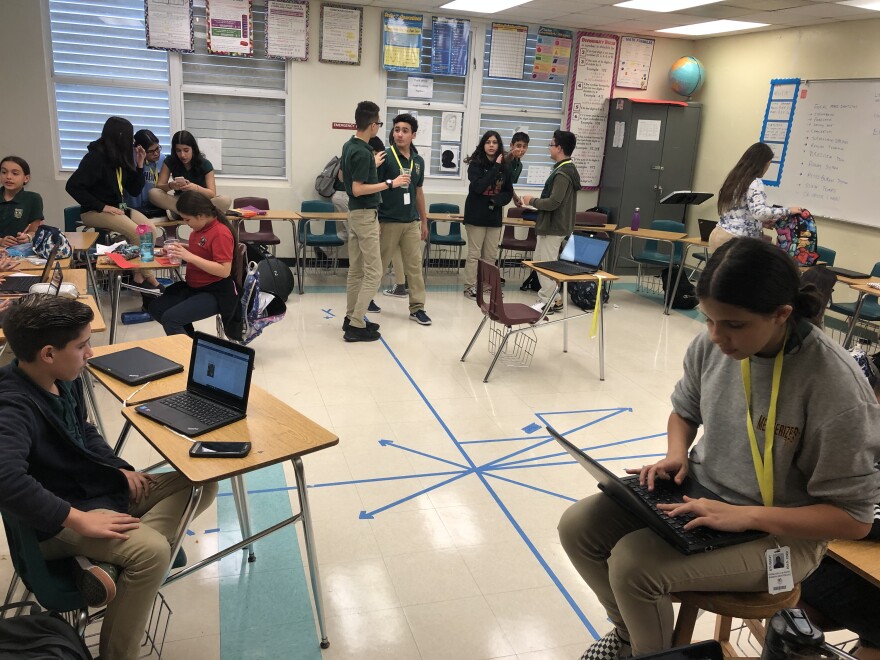The morning after the Feb. 14, 2018, Parkland shooting, Miami-Dade middle school teacher Kelsey Major stood in front of his speech-and-debate class and had no idea what to say.
“It's a powerful thing when 13-year-olds and 14-year-olds are looking up to you for an answer to something that you don't have an answer for,” Major said. “And if you try to manufacture something, they know that it's fraudulent, and they don't believe it.
“In speech and debate, I was speechless,” he said.
What started as a loss for words later became a group civics project aimed at ending gun violence.
In an after-school club, students at Everglades K-8 Center in Westchester are working on their second edition of a magazine designed to persuade federal lawmakers to pass legislation that would help prevent mass shootings. The students are advocating for a range of policy changes, including further limits on gun ownership, “red flag” laws to keep guns away from potentially dangerous people and greater investment in mental health care in schools.
The publication, called “First Shot,” features persuasive essays about gun reform policies, short biographies and drawings of victims, data analysis of mass shooting statistics and poetry. This year, the focus is on shootings in "safe and sacred places," such as schools and houses of worship.
The group is trying to raise money to print a copy of the magazine for every member of the U.S. House and Senate — all 535 of them.
The students are also planning a bus trip to deliver the magazines to federal lawmakers’ South Florida offices. The field trip is being funded with a $1,250 grant from The Education Fund, a nonprofit that supports public school teachers in Miami-Dade County. The group also supported the students’ project last year.
“Our goal is for all of them to listen to us, the youths, because we are the future,” said eighth grader and club member Susana Martinez. “That's what legislators always say — that we are the future. But what about the now?"
Fellow eighth grader Angelina Cotnam, who is one of the group’s leaders, wrote a harrowing poem for the magazine that depicts a school shooting from the perspective of a student hiding in a classroom.
Here’s an excerpt:
We do what we know: crowd together like rats. That's all we are to them anyway, right? It's silent, silent in a way that suffocates. And it's calm, chilling us to the bone, because we know how this ends. In the corner, a light shines with a final goodbye. We don't say anything. It won't matter anyway. We hear him, and he barrels through the hallway, all blazes and fire, And for a moment, we swear this is what hell feels like. Time stops, but not for long.
Angelina said it’s scary that adults seem to be helpless when it comes to mass shootings, unable to stop them.
“It's terrible to know every time we have an alarm or a drill — we don't know if it's a drill or not, it could be real — that it could be our last day seeing our friends and our parents and everyone we care for alive,” she said.
Acknowledging that gun violence is an emotionally difficult topic for young people, Major asked a colleague to attend the club’s meetings specifically to look after students’ mental health. Special education teacher Olga Carballo said she practices mindfulness and leads breathing exercises with students. If she notices students who seem depressed or anxious, she refers them to the school’s counselor.
"We would not have even introduced this — this would be inappropriate if students were not being killed in schools," Major said. "But the mere fact that students are being harmed in schools in these mass shootings, and it seems as if very little is being done, we know that the topic is appropriate. But we do take care."

Major teaches math as well as speech and debate, and it’s his third year in the classroom. Previously, he owned a small business managing facilities and janitorial services for companies and retail stores, but it closed after the Great Recession in the late 2000s.
Major and his wife homeschooled their three children for much of elementary and middle school; their two sons are now in public high schools, and their daughter is in college. That experience led Major to the classroom.
Also, the political climate leading up to the 2016 elections worried him, and he believed he could contribute toward restoring civility and preserving democracy in the U.S. by teaching in a public school.
In his first year in the classroom, he received a grant from The Education Fund to support a project using Google Earth to teach geometry. He used a second award last year to print the first edition of the gun violence magazine.
In the fall, he gave a presentation to other Miami-Dade teachers about how the magazine project can be replicated and even applied to other issues, like climate change and human trafficking.
He said the club doesn’t have a specific political agenda, and the student members’ views aren’t all the same. Some have parents who own guns, while others think the Second Amendment should be scaled back.
Sometimes, the students disagree.
“We’re humans,” Major said. “When the kids get into the partisan debates, we redirect it right back to … our common goal.”
That’s making sure that when students go to school in the morning, they come home safely in the afternoon. That shouldn’t be controversial, he said.
“If we can get this generation to be above politics, we can be in a better place,” he said.











